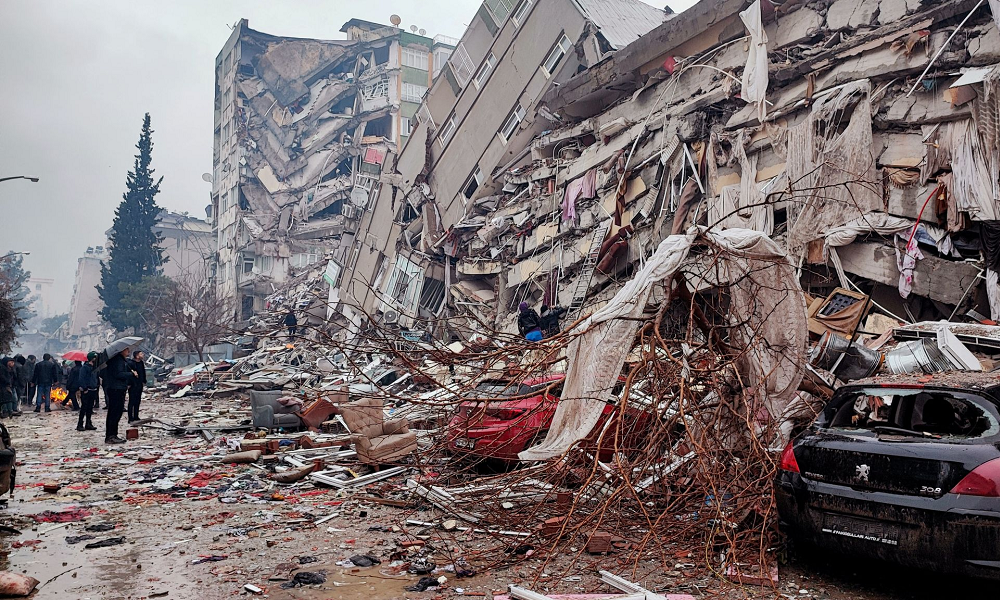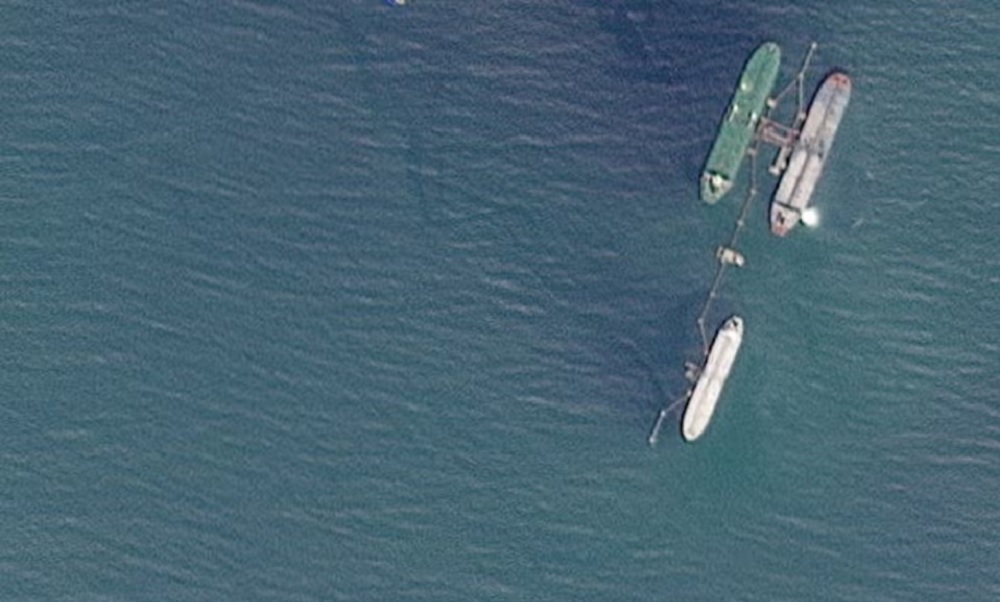World
Huge earthquake kills 2,400 in Turkey and Syria, bad weather worsens plight

A huge earthquake killed more than 2,400 people across a swathe of Turkey and northwest Syria on Monday, with freezing winter weather adding to the plight of the many thousands left injured or homeless and hampering efforts to find survivors.
The magnitude 7.8 quake brought down whole apartment blocks in Turkish cities and piled more devastation on millions of Syrians displaced by years of war.
The worst tremor to strike Turkey this century, it came before sunrise in harsh weather and was followed in the early afternoon by another large quake of magnitude 7.7.
“It was like the apocalypse,” said Abdul Salam al-Mahmoud, a Syrian in the northern town of Atareb. “It’s bitterly cold and there’s heavy rain, and people need saving.”
The second quake was big enough to bring down more buildings and, like the first, was felt across the region, endangering rescuers struggling to pull casualties from the rubble, Reuters reported.
In Diyarbakir in southeast Turkey, a woman speaking next to the wreckage of the seven-storey block where she lived said: “We were shaken like a cradle. There were nine of us at home. Two sons of mine are still in the rubble, I’m waiting for them.”
She was nursing a broken arm and had injuries to her face.
The earthquake was the biggest quake recorded worldwide by the U.S. Geological survey since a tremor in the remote South Atlantic in August 2021.
In Turkey, the death toll stood at 1,541, Vice President Fuat Oktay said. At least 928 people were killed in Syria, according to figures from the Damascus government and rescue workers in the northwestern region controlled by insurgents.
Poor internet connections and damaged roads between some of the worst-hit cities in Turkey’s south, homes to millions of people, hindered efforts to assess and address the impact.
Temperatures in some areas were expected to fall to near freezing overnight, worsening conditions for people trapped under rubble or left homeless. Rain was falling on Monday after snowstorms swept the country at the weekend, Reuters reported.
It is already the highest death toll from an earthquake in Turkey since 1999, when a tremor of similar magnitude devastated the heavily populated eastern Marmara Sea region near Istanbul, killing more than 17,000.
President Tayyip Erdogan, who is preparing for a tough election in May, called it a historic disaster and the worst earthquake to hit Turkey since 1939, but said authorities were doing all they could.
“Everyone is putting their heart and soul into efforts although the winter season, cold weather and the earthquake happening during the night makes things more difficult,” he said.
Turkish state broadcaster TRT showed a building collapse in the southern province of Adana after the second quake. It was not immediately clear if it was evacuated.
In Syria, already wrecked by more than 11 years of civil war, the health ministry said 538 people had been killed and more than 1,326 injured. In the Syrian rebel-held northwest, emergency workers said 390 people had died.
The Norwegian Refugee Council said the earthquake would only add to the suffering of millions of Syrians already enduring a humanitarian crisis due to the civil war.
In the Turkish city of Diyarbakir, Reuters journalists saw dozens of rescue workers searching through a mound of debris, all that was left of a big building, and hauling off bits of wreckage as they looked for survivors. Occasionally they raised their hands and called for quiet, listening for sounds of life.
Men carried a girl wrapped in blankets from a collapsed building in the city. In Izmir, drone footage showed rescue workers stood atop a hill of rubble where a building once stood, working to lift slabs of masonry.
Footage circulated on Twitter showed two neighbouring buildings collapsing one after the other in Syria’s Aleppo, filling the street with billowing dust.
Two residents of the city, which has been heavily damaged in the war, said the buildings had fallen in the hours after the quake, which was also felt in Cyprus and Lebanon.
In the Syrian rebel-held town of Jandaris in Aleppo province, a mound of concrete, steel rods and bundles of clothes lay where a multi-storey building once stood.
“There were 12 families under there. Not a single one came out. Not one,” said a thin young man, his eyes wide open in shock and his hand bandaged.
Raed al-Saleh of the Syrian White Helmets, a rescue service in rebel-held territory known for pulling people from the ruins of buildings destroyed by air strikes, said they were in “a race against time to save the lives of those under the rubble”.
The casualty toll in northwestern Syria was expected to increase, a spokesperson for the U.N. office for coordinating humanitarian affairs in northwestern Syria said.
“It just adds on to all the layers of suffering,” said Madevi Sun-Suon, the spokesperson.
In the Syrian government-held city of Hama, a Reuters journalist saw an apparently lifeless child carried from the ruins of a building.
Syrian state television showed rescue teams searching for survivors in heavy rain and sleet. President Bashar al-Assad held an emergency cabinet meeting to review the damage and discuss the next steps, his office said.
Erdogan said 45 countries had offered to help the search and rescue efforts in Turkey.
In the Turkish city of Malatya, a rescue worker crawled into a collapsed building, trying to identify a survivor trapped under the wreckage, in footage released by Turkey’s Disaster and Emergency Management Authority (AFAD).
“What colour are you wearing? Are you wearing pink? Please take care of yourself for the moment, I cannot see anything else,” the rescue worker could be heard saying.
World
Venezuela-US tensions spike in wake of seized tanker as Nobel winner vows change

Venezuelan opposition leader Maria Corina Machado on Friday promised political change after slipping out of the country in secret to collect the Nobel Peace Prize, as the shock waves intensified from the Trump administration’s seizure of an oil tanker earlier this week.
That escalation came on the heels of a large-scale U.S. military buildup in the southern Caribbean as President Donald Trump campaigns to oust Venezuelan leader Nicolas Maduro, pushing relations to their most volatile point in years, Reuters reported.
The effects could ripple through the region, with Venezuelan oil exports falling sharply and crisis-stricken Cuba, already straining to power its grid, at risk of losing supply.
The U.S. seizure of the Skipper tanker off Venezuela’s coast on Wednesday marked the first U.S. capture of Venezuelan oil cargo since sanctions were imposed in 2019.
The vessel is now heading to Houston, where it will offload its cargo onto smaller ships, Reuters reported.
The Trump administration does not recognize Maduro, in power since 2013, as Venezuela’s legitimate leader.
Washington has signalled more seizures are planned as part of efforts to choke off sanctioned oil flows, and subsequently imposed new sanctions on three nephews of Maduro’s wife and six tankers linked to them.
The U.S. military presence in the Caribbean has grown as Trump in recent weeks has discussed potential military intervention in Venezuela, based on accusations that the country ships narcotics to the United States. The Venezuelan government has denied the accusations.
So far there have been over 20 U.S. military strikes in the Caribbean and Pacific against suspected drug vessels this year, in which nearly 90 people have been killed, alarming human rights advocates and stirring debate among U.S. lawmakers.
While many Republicans have backed the campaign, Democrats have questioned whether the campaign is illegal and urged more transparency, including the release of a full, unedited video, opens new tab of strikes on a suspected drug-trafficking boat.
MACHADO DEFIES BAN, URGES TRANSITION
Machado defied a decade-long travel ban and a period in hiding to travel to Oslo on Thursday, noting that she would soon bring the Nobel Peace Prize back home to Venezuela.
She said Maduro would leave power “whether there is a negotiated changeover or not,” vowed she is focused on a peaceful transition, and thanked Trump for his “decisive support.”
Machado is aligned with U.S. hardliners who accuse Maduro of ties to criminal networks – claims that U.S. intelligence has reportedly questioned.
When asked at a press conference in Oslo if she believed U.S. intervention was needed in Venezuela, Machado replied, “We are asking the world to help us.”
Venezuela condemned the tanker seizure as “blatant theft” and “international piracy,” saying it would file complaints with international bodies.
At the same time, Venezuelan lawmakers took a step to withdraw the country from the International Criminal Court, which is currently investigating alleged human rights abuses in the South American country.
Adding to the friction, the Venezuelan government announced the suspension of a U.S. migrant repatriation flight on Friday. A U.S. official countered that deportation flights would continue.
World
Putin arrives in Ashgabat to hold series of meetings

Russian President Vladimir Putin has arrived in Turkmenistan’s capital for a two-day visit.
According to TASS, the presidential aircraft of the Rossiya Special Flight Detachment landed near the presidential terminal of Ashgabat International Airport, commonly referred to as the “small bird” for its distinctive design.
During his visit, Putin will attend an international forum titled “Peace and Trust: Unity of Goals for a Sustainable Future” and hold several bilateral meetings.
The Kremlin has confirmed talks with Turkish President Recep Tayyip Erdogan, while the Iranian Embassy has announced that a meeting with President Masoud Pezeshkian is also planned.
The Ashgabat forum will also be attended by Turkmen President Serdar Berdymukhamedov, along with the presidents of Armenia, Iraq, Kazakhstan, Kyrgyzstan, Uzbekistan and Tajikistan, as well as the prime ministers of Azerbaijan, Hungary, Georgia and Pakistan.
World
Trump launches gold card program for expedited visas with a $1 million price tag

President Donald Trump’s administration officially launched his “Trump Gold Card” visa program on Wednesday to provide a pathway, with a steep price, for non-U.S. citizens to get expedited permission to live in the United States.
The website Trumpcard.gov, complete with an “apply now” button, allows interested applicants to pay a $15,000 fee to the Department of Homeland Security for speedy processing, Reuters reported.
After going through a background check or vetting process, applicants must then make a “contribution” — the website also calls it a “gift” — of $1 million to get the visa, similar to a “Green Card,” which allows them to live and work in the United States.
“Basically it’s a Green Card, but much better. Much more powerful, a much stronger path,” Trump told reporters at the White House. “A path is a big deal. Have to be great people.”
Commerce Secretary Howard Lutnick said some 10,000 people have already signed up for the gold card during a pre-registration period and he expected many more to do so. “I would expect over time that we’d sell, you know, thousands of these cards and raise, you know, billions, billions of dollars,” Lutnick told Reuters in a brief interview.
Lutnick said the gold card program would bring people into the United States who would benefit the economy. He compared that to “average” Green Card holders, whom he said earned less money than average Americans and were more likely to be on or have family members on public assistance. He did not provide evidence for that assertion.
Trump’s administration has pursued a broad crackdown on immigration, deporting hundreds of thousands of people who were in the country illegally and also taking measures to discourage legal immigration.
The gold card program is the Trump version of a counter balance to that, designed to make money for the U.S. Treasury in the same way the president, a former New York businessman and reality television host, has said his tariff program has successfully done.
Lutnick noted that there was also a corporate version of the gold card that allowed companies to get expedited visas for employees they wanted to work in the United States, for a $2 million contribution per employee.
-

 Latest News2 days ago
Latest News2 days agoMuttaqi: Afghanistan’s progress requires both religious and modern education
-

 Sport4 days ago
Sport4 days agoILT20: Desert Vipers edge Gulf Giants in historic super over thriller
-

 Regional4 days ago
Regional4 days agoSix Pakistani soldiers killed in TTP attack in Kurram District
-

 Business4 days ago
Business4 days agoTrade bodies warn almost 11,000 Afghan transit containers stuck at Karachi port
-

 World4 days ago
World4 days agoPowerful 7.6 earthquake hits northern Japan, tsunami warnings issued
-

 Latest News3 days ago
Latest News3 days agoTrump calls Afghanistan a ‘hellhole’ country as US expands immigration restrictions
-

 Sport3 days ago
Sport3 days agoCommanding wins for Arman FC and Sarsabz Yashlar in Afghanistan Champions League
-

 Latest News5 days ago
Latest News5 days agoPakistan’s top general calls on IEA to pick between ties with Islamabad or TTP
























